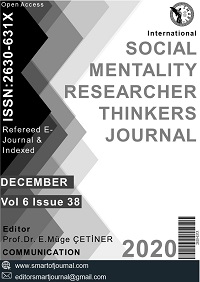ADALET VE KALKINMA PARTİSİ DÖNEMİ IŞIĞINDA EKONOMİK VAAT VE İCRAATLARIN HÂKİM PARTİ SİSTEMİNE ETKİSİ
Author :
Abstract
Siyaset bilimi literatüründe parti sistemleriyle ilgili yapılmış çeşitli tasniflere rastlanmaktadır. Bu tasnifler içinde yer alan parti sistemi türlerinden biri de hâkim-parti sistemidir. Bu sistem, meşru zeminde rekabete dayalı olarak yapılan seçimlerde bir partinin rakiplerini müteaddit defalar geride bırakarak iktidarını aralıksız en az 4-5 seçim dönemi veya en az yirmi yıl sürdürdüğü bir sistemi ifade etmektedir. Bu bağlamda Türkiye’de AKP (Adalet ve Kalkınma Partisi) dönemi hâkim-parti sistemi ile örtüşmektedir. Diğer taraftan hâkim-parti sistemi her ne kadar siyaset bilimcilerin tasniflerinde tek-parti sistemleri arasında gösterilse de ortaya çıkışı iki veya daha fazla partinin rekabet şansı yakaladığı demokratik rejim içinde gerçekleşmektedir. Demokratik rejimlerde ise iktidarın nihai belirleyicisi halk yani seçmenlerdir. Dolayısıyla seçmenlerin ısrarla bir siyasi partiyi tercih ediyor olması doğal olarak o partinin seçmenin teveccühünü kazanmayı başardığı anlamına gelmektedir. Literatürde de seçmenlerin siyasi partilere teveccühünü etkileyen çok sayıda faktörün bulunduğu, bunlar arasında ekonomik faktörlerin seçmen tercihlerinin şekillenişinde belirleyici rol oynadığı dile getirilmektedir. Bu ise AKP’nin, seçmenin teveccühü kazanmayı sağlayacak yüksek bir ekonomik performans sergilediği yönünde varsayımda bulunmayı mümkün kılmaktadır. Çalışmanın bu bağlamda amacı söz konusu bu varsayımı sınamak ve ekonomik alandaki icraatların hâkim parti sisteminin oluşumunda belirleyici olup olmadığını anlamaya çalışmaktır. Bu veçhile çalışmada, AKP’nin ekonomik vaat ve icraatlarındaki başarı durumu temel ekonomik göstergeler ışığında ele alınmış, elde edilen veriler somut bulgular olarak kabul edilip bunların seçmen tercihleriyle ilişkisi analiz edilmiştir.
Keywords
Abstract
Various classifications related to party systems are met with in the political science literature. One of the types of party system taked in among these classifications is the "dominant-party system". This system refers to a system in which a party maintains its powerf at least 4-5 consecutive election periods or at least twenty years without interruption by overtaking other rivals constantly, in elections held on a legitimate basis based on competition. In this context, in Turkey, the AKP (Justice and Development Party) period overlaps with the dominant party system. On the other hand, although the dominant-party system is shown among the single-party systems in the classifications of political scientists, its emergence takes place within the democratic regime in which two or more parties have a chance to compete. In democratic regimes, the ultimate determinant of power is the public that is, the electorate. Hence the fact that the electorate persistently prefer a political party means that that party has naturally managed to win the favor of electorate. It is stated in the literature that there are many factors affecting the electorate' favor to political parties but economic factors play a determining role in shaping voter preferences among them. This makes it possible to make the assumption that the AKP set out high economic performance that will enable to gain the electorate favor. In this context, the aim of the study is to test this assumption and try to understand whether the actions in the economic field are determinant in the formation of the dominant party system. İn this respect in the study, the AKP's economic promises and success in its actions were discussed in the light of basic economic indicators, the data obtained were accepted as concrete findings and their relationship with voter preferences was analyzed.
Keywords
- Altunoğlu, M.& Ete, H.&Dalay, G.(2013). Karşılaştırmalı Hâkim Parti Deneyimleri, Seta Yayınları,
- Altunoğlu, M.& Ete, H.&Dalay, G.(2013). Karşılaştırmalı Hâkim Parti Deneyimleri, Seta Yayınları, Ankara.
- Blondel, J. (1968). Party, Systemsand Patterns of Government in Western Democracies, CanadianJournal of Political ScienceVol. 1, No. 2, Canada, s.180-203.
- Campbell, A. & Converse, P.E.& Miller, W.E. &Stokes, D.E. (1964). The American Voter, New York: John Wiley&Sons.
- Çam, E. (2002). Siyaset Bilimine Giriş, 8. Baskı, Der Yayınları, İstanbul.
- Duverger, M. (1986). Siyasi Partiler, Çev. Ergun Özbudun, Bilgi Yayınevi, Ankara.
- Erdoğan, S.&Bozkurt, H.(2009). Türkiye’de Cari Açığın Belirleyicileri: Mgarch Modelleri ile Bir İnceleme, Maliye Finans Yazıları, Sayı.84, s.135-172
- Feldman, S., (1982). Economically Self-İnterested Political Behavior, American Journal of Political Science ,Vol. 26, No. 3. s.446-466.
- Gür, N. & Ünay, S. & Dilek, Ş.(2017). AK Parti’nin 15 Yılı Ekonomi, 1. Baskı, Seta Kitapları, İstanbul.
- Harrop, M. & William L. M. (1987) Electionand Voters: A Comparative Introduction, Mcmillan, London.
- Heywood, A. (2006). Siyaset, Liberte Yayınları, Ankara.
- Kapani, M. (1995). Politika Bilimine Giriş, Bilgi Yayınevi, Ankara.
- Kramer, Gerald H.(1983) The Ecological Fallacy Revisited: Aggregate- versus Individual-levelFindings on Economics and Elections, and Sociotropic Voting, The American Political Science Review , Vol. 77, No. 1, s. 92-111
- Özdağ, Ü. (2011). İkinci Tek Parti Dönemi, Kripto Basın Yayın Dağıtım, 1. Baskı, Ankara.
- Özsoy, E. & Tosunoğlu, T., Gsyh'nin Ötesi: Ekonomik Gelişmenin Ölçümünde Alternatif Metrikler, Ç.Ü. Sosyal Bilimler Enstitüsü Dergisi, Cilt 26, Sayı 1, 2017, s.285-301
- Rees, A. & Kaufman H. & Eldersveld, S. J. & Freidel, F. (1962). The Effect of EconomicConditions on Congressional Elections 1946-1958, The Review of Economics and Statistics , Vol. 44, No. 4, s. 458-465
- Saçık, Sinem Y. & Alagöz, M.(2010). Türkiye’de Cari İşlemler Açığı Sorunu Ve Borçlanma İle İlişkisi, Ekonomi Bilimleri Dergisi Cilt 2, Sayı 2, s.113-120
- Sartori, G. (1976). Parties and Party Systems A Framework For Analysis, Cambridge University Press.
- Sartori, G. (2005). Parties and Party Systems: A Framework for Analysis, ECPR Press, UK.
- Scarbroug, E. (1984). Political Ideology and Voting: An Exploratory Study. (H.Güllüpınar, E. Diker, & E. S. Aslan, Eds.) Oxford: Clarendon Press.
- Sitembölükbaşı, Ş. (2001). Parti Seçmenlerinin Siyasal Yönelimlerine Etki Eden Sosyoekonomik Faktörler, Nobel Yayınları, Ankara.
- Şahin, B., E.(2011). Türkiye’nin Cari Açık Sorunu, Ekonomi Bilimleri Dergisi Cilt 3, No 2, s.47-56 Üstünel, B. (1988), Ekonominin Temelleri, Beşinci Baskı, Ankara.
- Tura, A. R. (2003), Psikanalitik Açıdan Homo Economicus, İktisat’ın Dama Taşları Ekoller- Kavramlar İz Bırakanlar III, Kurtiş Matbaacılık, İstanbul, 221-235.





